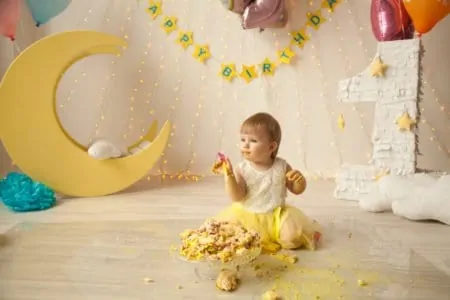The toddler years are special. Some parents dread them, while others can’t wait. Toddlerhood is famous for causing meltdowns and tantrums, but they’re also the years when your baby will learn to talk and master the skill of walking. But one unexpected event some parents have to deal with is head banging.
This is quite common, and being a mother to a head banger myself, I know it can also be distressing. Seeing your toddler resort to banging their head on the floor or wall during a meltdown can make you question your parenting skills.
Because this became a bad habit for my child, I quickly started researching how to stop toddlers from banging their heads. The results were helpful for me, and I’m confident they will be for you.
Key Takeaways
- Head banging is common in toddlers, often used for self-soothing, expressing frustration, seeking attention, or relieving pain.
- To stop head banging, show empathy, provide attention, avoid scolding, and hide your worries.
- Creating a soothing bedtime routine can help reduce head banging before sleep.
- Consult a pediatrician if you’re concerned about your child’s head banging or if it’s accompanied by other concerning behaviors.
Why Toddlers Bang Their Heads
You may be surprised to learn that head banging is common. It’s estimated that approximately 20% of toddlers and babies bang their heads (1). Interestingly, boys are more likely to adopt this habit than girls — for boys, the chances increase three times more (2).
Many parents who visit my office express concern about head banging due to fear of injury. In most cases, however, toddlers are “smart enough” to know how to do it to gain a parent’s reaction but not to hurt themselves.
Editor's Note:
Dr. Leah Alexander, MD, FAAPSeeing your toddler behaving like this isn’t easy, and we often think it’s our fault for not being a good parent. But toddlers generally don’t do this because of poor parenting skills. Here are some surprising reasons behind this behavior:
1. Self-Soothing
It’s hard to believe that a toddler would bang their head to self-soothe, but when reading a little further, it kind of makes sense. Somehow, banging their head can be a way for your toddler to relax. If so, they do it rhythmically as they fall asleep, while sleeping, or when they wake up during the night (3).
The technique differs between toddlers. Some will sway back and forth on all fours, while others make a rocking motion. The rhythmic movement is believed to be similar to rocking in a rocking chair, thus soothing the toddler (4).
Depending on where your toddler is, they may bang their head into the mattress or pillow. If they sit up, it’s probably against the crib wall. Some toddlers may even begin to hum or vocalize until they fall back asleep.
It does sound disturbing, but if your little one is otherwise healthy and happy, there’s no need to worry.
2. Frustration
Now onto something that makes a little more sense — frustration. If your toddler bangs their head during a tantrum, it’s likely to be emotions and stress they can’t otherwise communicate. Toddlers deal with a lot of emotions. Toddlerhood is a time full of changes and a need to be independent (5).
Also, not all toddlers can talk, making it challenging to express feelings. Because of this, many turn to physical actions as a way to get their frustration out, communicate, and self-soothe.
3. Pain Relief
Sometimes distraction is the best medicine against pain. Toddlers will, at times, substitute one pain for another. It’s not unusual for toddlers to bang their heads due to teething pain or ear infections. Alternatively, toddlers may use a hand to hit the side of their head when experiencing this type of pain.
For some toddlers, it seems to make the pain better. It can, however, still be a way to communicate their distress to you.
4. Seeking Attention
Toddlers aren’t fully confident in how to communicate, so sometimes, they’ll resort to extremes for some attention. Head banging is often a way to get your attention, especially as your toddler sees how concerned you get. They learn that head banging will get them instant attention (6).
Head banging for attention can be challenging to stop. If you give your child attention, you’ll feed into the habit, but if you ignore them, they may seriously hurt themselves if near furniture or other objects. We’ll explore how to stop it further below.
5. Developmental Problems
Head banging and other self-injurious behavior is often associated with developmental problems like autism. Head banging alone is rarely a cause for concern. But if you notice your toddler does other activities like biting hands, scratching, or rubbing, consult your pediatrician (7).
When Do Toddlers Start Banging Their Heads?
When and if your toddler begins banging their head on purpose depends on your baby. Some start rather early, around 6 months, and will continue the behavior into childhood. Others won’t start until reaching the toddler years, approximately 18 months.
Most children will usually stop once they realize the habit isn’t beneficial. This can be at age 3 for some, while others are still doing it at 5 years old.
How to Stop Toddlers From Banging Their Heads
1. Try Empathy
Try showing empathy if your toddler feels frustrated due to not getting their way. Acknowledge what they’re angry about. Then say something like, “You are very angry — you wanted the … but Mommy said no.”
Always remember that toddlers want many things but rarely understand some things aren’t possible. By empathizing, you’re acknowledging their feelings without giving in. This may not stop the head banging at first, but it will soon catch on that Mom and Dad understand.
2. Provide Attention
Give your little one plenty of attention during the happy times when they’re not banging their head. It’s not always easy since toddlers constantly have something to show or say, but try your best (8).
Try to respond to needs and cries — even if it’s a no, try to say it positively. If they bang their head again, act casual about it. If you make a big fuss, you’re reinforcing the habit, which only makes it worse.
3. Don’t Scold
You may feel that the obvious reaction to this type of behavior is a big “No” and then a time-out. However, toddlers are still too young to understand this, and negatively showing your disapproval can worsen the behavior. Also, giving this type of attention, albeit negative, is still considered a “win” by toddlers. It is best to keep your reactions mild.
When your child bangs their head, avoid scolding or punishment. Your toddler is likely to feel more frustrated and will continue.
A clinical note about saying “no” and “stop” to toddlers: Many of the parents who visit my practice, out of what seems like a necessity, find themselves telling their toddlers these two words very frequently. They are then surprised when “no” and “stop” become some of their toddler’s first words. Also, when heard so often from a parent, these words tend to lose their desired effect. I counsel my parents to save “no” and “stop” for situations that could be harmful or unsafe for their toddler (i.e., trying to run away in a parking lot or touching a hot stove). At other times, distraction or redirection is a better and more effective tactic.
Editor's Note:
Dr. Leah Alexander, MD, FAAP4. Hide Your Worries
Bruises are bound to occur from such behavior at some point, but do your best not to worry. Head banging is a self-regulating habit, which means your toddler is unlikely to cause serious injury. If it starts to hurt them, they’ll pull back a bit to avoid the pain.
You can always make the possible head banging surfaces safe. If your toddler does this to self-soothe, ensure the crib remains stable after repeated rocking. Check the screws and bolts occasionally to verify nothing is coming loose (9).
Place soft fabric between the crib and wall and perhaps even rubber casters on the legs of the crib. Avoid using pillows or blankets on the mattress to soften it up, as it could present a suffocation hazard.
Pool noodles work wonders on crib railings — just ensure that they’re secured. Place fabric around the noodle to stop your toddler from taking a bite. Also, verify that they can’t get their head through the crib railings — again, soft fabric works here.
If possible, place rugs or soft tiles around the floors. If there is furniture or another object nearby that could result in injury, move it. My toddler would always bang his head against the floor whenever he got frustrated.
5. Create a Safety Net
If your toddler has bottled-up frustrations, chances are they need a good cry. When flooded by so many emotions, it’s easier for them to bang their head against something. In such circumstances, the best thing to do is to show that you’re there and won’t scold them if they cry.
Create a safety net for them to fall into. Circle back to empathy and show how you understand their feelings. Keep reassuring them that you are right here and won’t go away.
Not all toddlers want to be held at such times, and if so, keep your distance while making soothing comments. You can say something like, “I’m right here to keep you safe. It’s okay to cry. I can see that you’re upset.”
Get down to eye level with them. Sit down and continue to soothe with your voice.
If they start to cry, stop talking. Your toddler will come to you soon for a hug. It can be heart-wrenching to see your little one like this. Keep reminding yourself that you’re doing a fantastic job at letting them cry as opposed to punishing them.
6. Create a Soothing Bedtime Routine
After a long, hard day at work, we often come home feeling defeated and frustrated — it’s the same for toddlers. If your toddler typically bangs their head at bedtime during meltdowns, it’s due to a long day. You can combat this by creating a soothing bedtime routine.
This could begin with a bath, then cuddle time, followed by a story or song. It will help your little one unwind and go to bed feeling relaxed.
7. Consult Your Pediatrician
If your toddler’s behavior worries you, always consult your pediatrician. If the head banging continues while it seems to be hurting your child, it’s time to worry (10). This could be a sign of a developmental problem such as autism.









